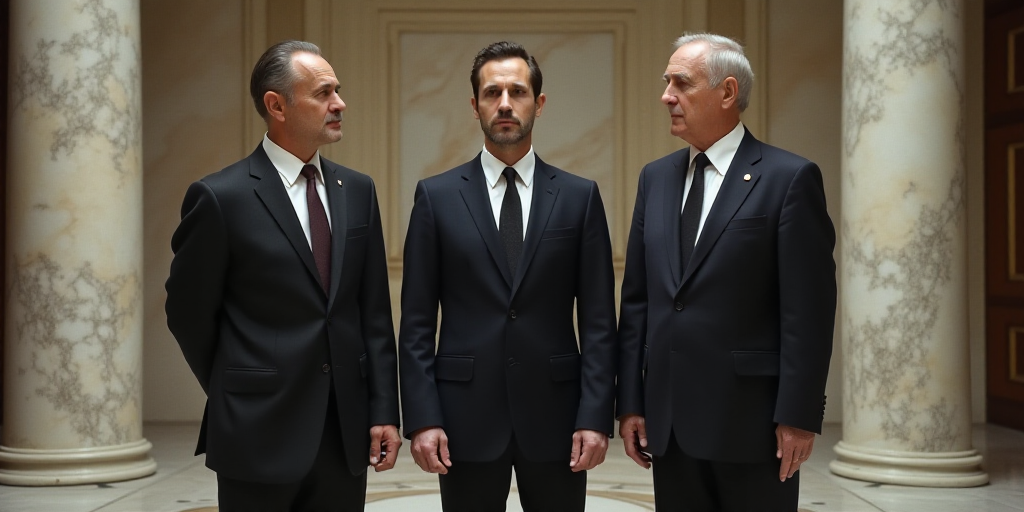Background on Key Figures and Relevance
The European leaders mentioned in this article include the heads of state from the United Kingdom, France, Germany, Poland, and Ukraine. They are joined by United States President Donald Trump in their demand for a ceasefire in Ukraine. Vladimir Putin, the Russian President, is the central figure as he has been leading Russia’s military actions in Ukraine since 2022. Understanding their roles and influence is crucial to grasping the gravity of this diplomatic situation.
Ceasefire Demand and Support
European Leaders’ Joint Call:
On Saturday, the leaders of these European nations supported an unconditional 30-day ceasefire in Ukraine, with backing from President Trump. They warned Putin of “massive” new sanctions if he does not accept within days.
Meeting in Kiev:
During a meeting in Kiev, the leaders set the start of the ceasefire for May 12th. They held a telephone conversation with Trump, emphasizing that Putin has the chance to demonstrate his commitment to peace without further delays or conditions.
British Prime Minister Keir Starmer’s Statement:
“We, along with the United States, are appealing to Putin. If he takes peace seriously, he has the opportunity to show it,” Starmer stated during a press conference.
Russian Response
Kremlin Spokesperson Dmitri Peskov’s Reaction:
Following the announcement, Peskov criticized what he perceived as contradictory statements from Europe, often confrontational and not aimed at reviving relations. He stated that Russia would only consider a 30-day ceasefire with due consideration of the “nuances.”
Sanctions and Western Unity
Escalating Western Sanctions:
Since Russia’s large-scale invasion of Ukraine in 2022, Western sanctions against Russia have been repeatedly strengthened without ending the war. Complying with the ceasefire demand would signal growing Western unity after months of uncertainty in U.S. policy following Trump’s return to the White House in January.
Trump’s Frustration:
Despite not publicly commenting on the European leaders’ statements, Trump has expressed frustration with what he perceives as Putin’s dilatory approach to the ceasefire.
French President Emmanuel Macron’s Warning:
“If the ceasefire is violated, massive sanctions will be prepared in coordination between Europeans and the United States,” Macron stated.
Alignment with Western Europe:
Imposing new sanctions would bring the White House more in line with Western Europe, which has been shaken by a trade war where Trump imposed tariffs on them and other countries, suggesting he might not defend NATO allies who don’t spend enough on their defense.
Ukraine’s Position
Zelenski’s Agreement:
Ukrainian President Volodymyr Zelenskyy agreed with the European leaders that an unconditional 30-day ceasefire should begin on Monday, covering air, sea, and land. If Russia refuses, it would face new sanctions, including reinforced measures targeting its energy and banking sectors.
Peskov’s Stance:
Russia supports a 30-day ceasefire, but only after proper consideration of the “nuances,” according to Peskov’s statement on Friday.
Peskov’s Suggestion:
In an interview with ABC News, Peskov implied that Western military aid to Ukraine should cease for a temporary truce to take effect. “Otherwise, it will be an advantage for Ukraine,” he stated.
“Express of Courage”
Macron’s Supervision Plan:
Macron noted that the ceasefire, if implemented, would be primarily supervised by the United States, while European countries would contribute. The U.S. has a significant role in this diplomatic effort.
Dmitri Medvedev’s Mockery:
The former Russian President, now a high-ranking security official, mocked the idea of giving Russia a choice between sanctions or allowing Ukrainian forces to rebuild. “Put these peace plans where the sun doesn’t shine,” he wrote on social media.
Key Questions and Answers
- What is the demand from European leaders? They are calling for an unconditional 30-day ceasefire in Ukraine starting May 12th, with backing from the US and threats of massive new sanctions if Russia does not comply.
- How has Russia responded? The Kremlin spokesperson, Dmitri Peskov, criticized European statements and stated that Russia would consider a ceasefire only after due consideration of the “nuances.”
- What are the implications of new sanctions? New sanctions would align the U.S. more closely with Western Europe, which has been affected by a trade war initiated by Trump’s tariffs on them and other countries. It also signals growing Western unity after months of uncertainty in U.S. policy.
- What is Ukraine’s stance? President Zelenskyy agreed to the 30-day ceasefire, stating that if Russia refuses, it would face new sanctions, including reinforced measures targeting its energy and banking sectors.
The European leaders’ visit to Kiev, dubbed the “Express of Courage,” highlights their solidarity with Ukraine amidst ongoing conflict. Their joint efforts aim to bring an end to the hostilities and enforce accountability through sanctions.






